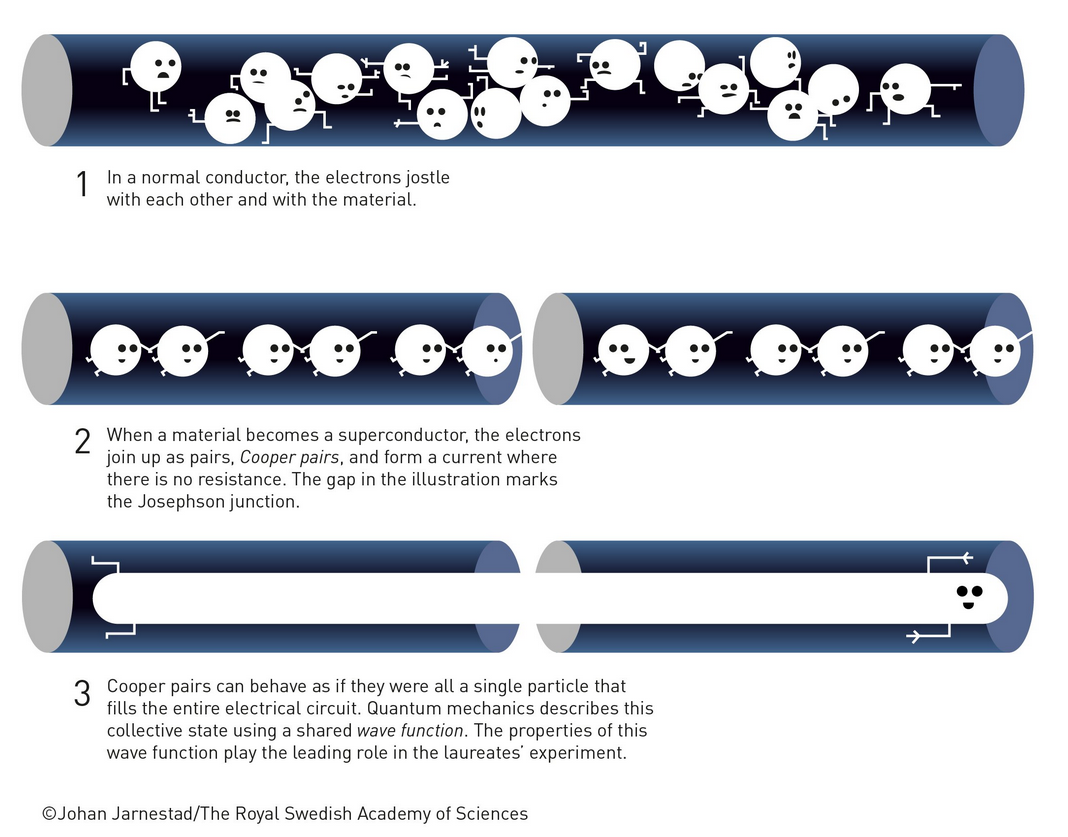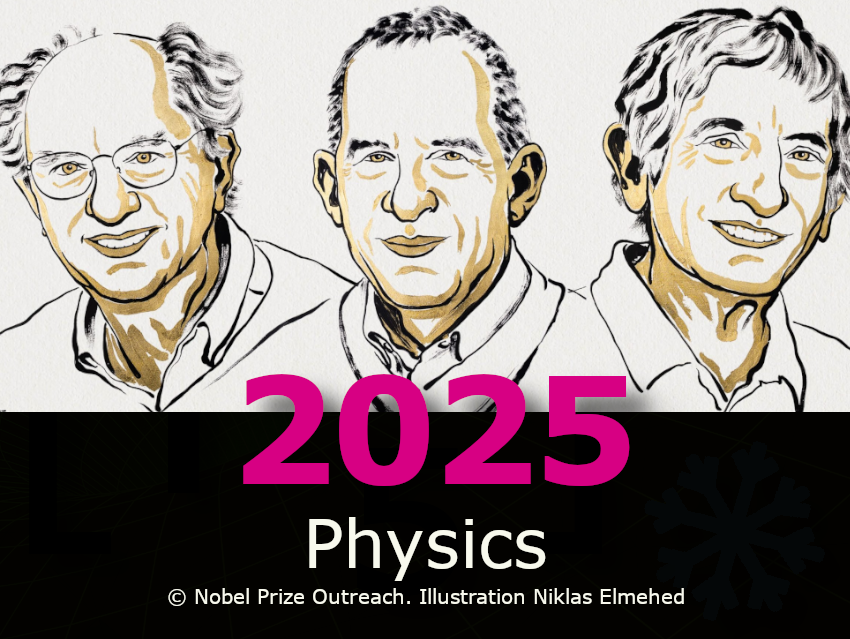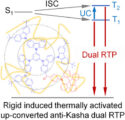The Nobel Prize in Physics 2025 has been jointly awarded to
- John Clarke, University of California, Berkeley, CA, USA,
- Michel H. Devoret, Yale University, New Haven, CT, USA, and University of California, Santa Barbara, CA, USA, and
- John M. Martinis, University of California, Santa Barbara, CA, USA,
for “the discovery of macroscopic quantum mechanical tunneling and energy quantization in an electric circuit” [1].
A key question in physics is how large a system can be while still showing quantum effects. The researchers showed that an electrical circuit small enough to hold in one’s hand can display quantum tunneling and energy quantization.
Quantum mechanics allows particles to pass directly through barriers in a process known as tunneling. However, when many particles are involved, these quantum effects typically disappear.
A ball for example is built up of a huge amount of molecules and shows no quantum mechanical effects, it will bounce back when it is thrown at a wall. A single particle will sometimes pass straight through an equivalent barrier in its microscopic world and appear on the other side, it tunnels through the barrier.
1 Research
In 1984/1985, John Clarke, Michel H. Devoret, and John M. Martinis studied an electronic circuit made of superconductors (components that can conduct a current with no electrical resistance) separated by a thin insulator, called a Josephson junction. By refining and measuring all the various properties of their circuit, they were able to control and explore the phenomena that arose when they passed a current through it.
They showed that the charged particles moving through the superconductor act like a single large particle. This macroscopic particle-like system, which is initially in a state in which current flows without any voltage, could escape this trapped state without voltage through quantum tunneling. The energy changes occur in discrete, quantized amounts [1].

Their work confirmed that quantum mechanics applies to macroscopic systems and opens the way for advanced technologies like quantum computers, quantum cryptography, and quantum sensors.
2 Laureates
John Clarke, born in Cambridge, UK, in 1942, studied physics at the University of Cambridge and received his Ph.D. there in 1968. He then went to the University of California, Berkeley, first as a postdoctoral researcher, then as an assistant professor (1969), associate professor (1971), and finally professor of physics (1973–2010).
Currently, he is a Professor of Experimental Physics at the University of California at Berkeley, USA.
John Clarke was awarded many honors, including the Comstock Prize in Physics in 1999 and the Hughes Medal in 2004. He was elected a Fellow of the Royal Society in 1986, a foreign associate of the US National Academy of Sciences in 2012, and was elected to the American Philosophical Society in 2017.
Michel H. Devoret, born in Paris, France, in 1953, studied at Ecole Nationale Supérieure des Telecommunications in Paris and earned his Ph.D. in physics from the University of Orsay (University of Paris-Sud), France, in 1982, while working in the molecular quantum physics group at Paris. During post-doctoral training for two years, he worked on macroscopic quantum tunneling in John Clarke’s laboratory at the University of California, Berkeley. He started his own research group at the Commissariat à l’Energie Atomique (CEA) at Saclay, France, and joined Yale in 1999.
He is the F. W. Beinecke Professor Emeritus of Applied Physics at Yale University and also holds a position as the Director of the Applied Physics Nanofabrication Lab at Yale. Currently, he is the Chief Scientist at Google Quantum AI.
Michel H. Devoret was awarded many honors, including the Micius Quantum Prize in 2021 and the John Bell Prize in 2013.
John M. Martinis, born in 1958, studied physics at the University of California, Berkeley, USA, where he also earned his Ph.D. under the superviion of John Clarke. He joined the Commissariat à l’Énergie Atomique in Saclay, France, for his first postdoctoral position and later worked in the Electromagnetic Technology Division at the National Institute of Standards and Technology (NIST) in Boulder, CO, USA. In 2004, he moved to the University of California, Santa Barbara, where he held the Worster Chair in Experimental Physics until 2017. From 2014 to 2020, Martinis and his team worked at Google to develop the first practical quantum computer.
In 2020, Martinis relocated to Australia to join Silicon Quantum Computing, a start-up founded by Professor Michelle Simmons.
In 2022, he co-founded Qolab, based on the premise that “the semiconductor industry holds the key to creating a practical quantum computer by enabling the large-scale fabrication of high-quality qubits.” Since 2025, he has served as the company’s Chief Technology Officer.
Among many other honors, he received the John Stewart Bell Prize for Research on Fundamental Issues in Quantum Mechanics and Their Applications in 2021.
Sources
[1] Website of the The Nobel Foundation nobelprize.org
- John Clarke, Andrew N. Cleland, Michel H. Devoret, Daniel Esteve, John M. Martinis, Quantum Mechanics of a Macroscopic Variable: The Phase Difference of a Josephson Junction, Science 1988, 239(4843), 992-997. https://doi.org/10.1126/science.239.4843.992
- John M. Martinis, Michel H. Devoret, John Clarke, Experimental tests for the quantum behavior of a macroscopic degree of freedom: The phase difference across a Josephson junction, Phys. Rev. B 1987, 35, 4682. https://doi.org/10.1103/PhysRevB.35.4682
- John M. Martinis, Michel H. Devoret, John Clarke, Energy-Level Quantization in the Zero-Voltage State of a Current-Biased Josephson Junction, Phys. Rev. Lett. 1985, 55, 1543. https://doi.org/10.1103/PhysRevLett.55.1543
Also of Interest
- Nobel Prize in Physics 2024,
John Joseph Hopfield, Princeton University, and Geoffrey E. Hinton, University of Toronto, were honored for foundational discoveries and inventions that enable machine learning (ML) with artificial neural networks - Who’s Next? Nobel Prize in Chemistry 2025,
Make your predictions for the 2025 Nobel Prize in Chemistry - Collection: Nobel Prize in Chemistry
Collection of interviews with Nobel Laureates and Nobel Prize quizzes





